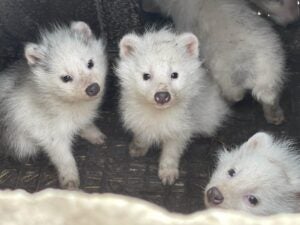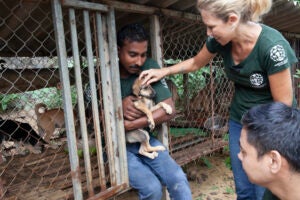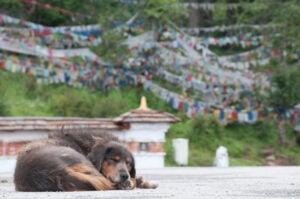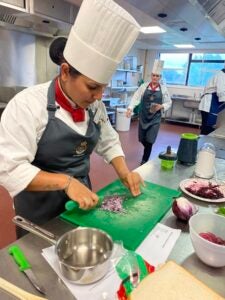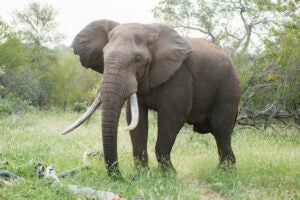
OTTAWA, Ontario—The Canadian government has banned domestic trade in elephant ivory and rhino horn, as well as the import of hunting trophies containing these parts. The landmark measures fulfill a 2021 Ministerial mandate and are a critical step in protecting these iconic species. The move follows a seven-year campaign by Humane Society International/Canada and has overwhelming support from leading conservationists, animal protection groups, African nations and notable Canadians.
The African elephant population has declined by 96% over the last century, with scientists warning that they, as well as many rhinoceros species, could become extinct within the next few decades in the absence of global intervention to disincentivize poachers.
Those involved in the decision issue the following statements:
Steven Guilbeault, minister of Environment and Climate Change Canada, said: “Our government is committed to protecting, conserving and enhancing the world’s biodiversity, including reversing the global decline in elephant and rhinoceros populations. By strengthening Canada’s response to wildlife trafficking, we will enforce practical solutions that effectively address the illegal ivory trade and support species conservation. Canadians overwhelmingly support stricter controls and the Government of Canada is delivering.”
Kelly Butler, campaign manager for Humane Society International/Canada, stated: “Elephant and rhino populations have been decimated by global trade in their parts, and poaching causes considerable suffering to these incredible animals. In banning trade in elephant ivory and rhino horn, the Canadian government has shown considerable leadership and reflected the will of Canadians and the vast majority of African nations holding elephant populations. At last, Canadians can rest assured that our country is doing our part to ensure these majestic animals have a future.”
Dr. Winnie Kiiru, Kenyan biologist and leading elephant conservationist, said: “I am thrilled that Canada has enacted these urgently needed regulations in order to safeguard elephant and rhino populations. As a conservationist working on the ground in Kenya, I have seen firsthand the devastating effects of poaching and trophy hunting on African elephant and rhino populations. We need countries around the world to act now in order to protect these amazing animals, and Canada’s actions send an important message: ivory belongs to elephants.”
Dieudonné Yameogo, director of Wildlife and Game resources of Burkina Faso, stated: “Burkina Faso congratulates Canada on this historic decision. Canada follows in the footsteps of other countries, such as the USA, China, Hong Kong SAR and the EU, which have all closed or severely restricted their domestic ivory markets in recent years. This sends a very strong message to all traffickers and poachers: ivory has no market value, anywhere in the world! These measures taken by these various countries could lead to a significant drop in illegal elephant killings in all African elephant range states, and particularly in Burkina Faso.”
Bryan Adams, order of Canada recipient and one of the best-selling musicians of all time, stated: “As a long-time animal advocate, I am thrilled that Canada has listened to the overwhelming number of Canadians who demanded action to end the senseless killing of elephants and rhinos. The policies enacted by the Canadian government set a powerful precedent for countries around the world to join the fight to protect elephants and rhinos.”
Robert Bateman, renowned Canadian artist and conservationist, stated: “I have had the great privilege of observing wild African elephants and, like so many other Canadians, I am devastated by the prospect of their extinction and their ongoing suffering at the hands of humans. The survival of African elephants and rhinos hinges on the actions of the global community, and I commend Canada for enacting meaningful policies to safeguard these amazing animals for generations to come.”
The creators of The Anthropocene Project (Edward Burtynsky, Jennifer Baichwal and Nicholas de Pencier), who documented the largest elephant ivory burn in history, which took place in Kenya in 2016, stated: “The poaching of elephants for ivory—from which international criminal syndicates profit—and the ensuing decimation of African elephant populations is tragic. Witnessing Kenya’s ivory burn was a very powerful moment for all of us and a shocking reminder of the scale at which elephants are being slaughtered, day after day, year after year. We commend the Canadian government for ending its role in this terrible, destructive industry which perpetuates the devastation of elephant and rhino populations.”
Fran Duthie, president of Elephanatics, stated: “The team at Elephanatics is thrilled that regulations to ban the elephant ivory and rhino horn trade, along with the import of hunting trophies containing these parts, are to be enacted by the Canadian Government. We would like to thank all the scientists, NGOs, politicians and people who worked tirelessly to make this happen. From the petition created by the Ivory Free Canada coalition that reached over 700,000 signatures and showed overwhelming support to save elephants and rhinos, to endless advocacy, to the collaboration of like minds working together to save a species, our mission to ban the elephant ivory and rhino horn trade has come to fruition. It is a time to be grateful and to celebrate this grand achievement. We did it!”
Facts:
- As many as 25,000 elephants and 1,300 rhinos die at the hands of poachers in Africa every year.
- In March 2021, the IUCN updated its Red List of Threatened Species and declared the African forest elephant to be Critically Endangered and the African savanna elephant to be Endangered. Black rhinos, found in Africa, are classified as Critically Endangered.
- Canada’s top trading partners, including the United States, China and the United Kingdom, have closed their elephant ivory markets in response to declining elephant populations.
- According to CITES data, over 450 African elephant tusks, 16 rhino horns, and an additional 81 elephant trophies and 44 rhino trophies were legally imported into Canada from 2010-2021.
- In June of 2021, an open letter calling for an end to elephant ivory trade in Canada was signed by notable Canadians including Bryan Adams, Robert Bateman and David Suzuki.
- The proposed regulations follow a public opinion consultation conducted by Environment and Climate Change Canada in the summer of 2021, in which Canadians and people from around the world overwhelmingly voiced their support for federal action to end Canada’s role in the elephant ivory trade.
- According to a 2020 poll by Insights West, 94% of Canadians support an elephant ivory trade ban.
- A public petition calling for a Canadian ban on elephant ivory trade amassed over 700,000 signatures.
ENDS
Media contact: HSI/Canada: Dominique Davidson, senior communications officer: ddavidson@hsi.org, 438-951-0350

